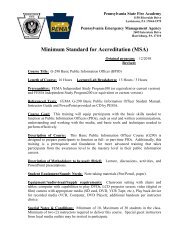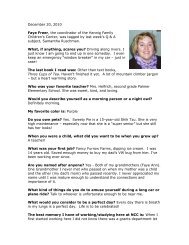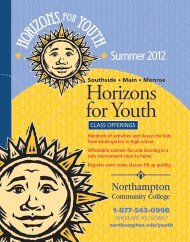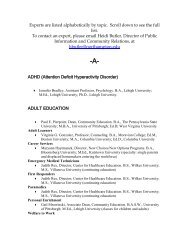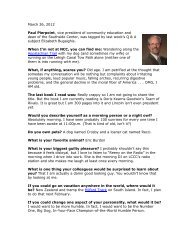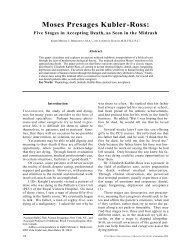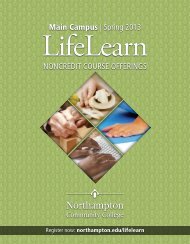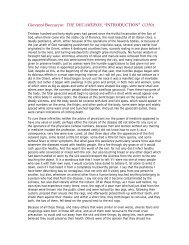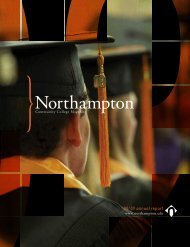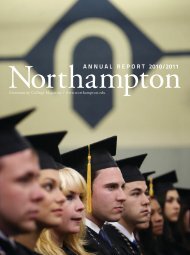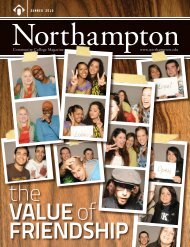SPRING 2008 Community College Magazine - Northampton ...
SPRING 2008 Community College Magazine - Northampton ...
SPRING 2008 Community College Magazine - Northampton ...
Create successful ePaper yourself
Turn your PDF publications into a flip-book with our unique Google optimized e-Paper software.
Locker Room Talk:<br />
NCC’s Coaches on Compensation, Competition and Commitment<br />
By Jim Johnson '89 and Ed Laubach<br />
“I’ve never had a coach complain to me about the amount of<br />
money we pay,” says Bill Bearse, recently retired director of<br />
athletics at <strong>Northampton</strong>, “Most of them simply aren’t doing<br />
it for the money.”<br />
“It’s not important,” Spartans tennis<br />
coach Jack Master says about his<br />
paycheck. “I’ve never talked to Bill<br />
about pay. Each year, they send<br />
me a contract and I sign it. But my<br />
season is pretty concise. It’s not<br />
like I’m involved 12 months a year.<br />
I enjoy the time with the kids while<br />
I’m here.”<br />
A retired teacher and history<br />
department coordinator at Easton’s<br />
Shawnee Intermediate School,<br />
Master has produced 26 individual<br />
state champions since taking over<br />
NCC’s tennis program in 1978. But<br />
winning isn’t his prime objective.<br />
The coach promises his tennis<br />
players that they will become more<br />
knowledgeable about the sport and<br />
have fun – the wins and losses<br />
will take care of themselves. “And<br />
we’ll all walk away,” he says, “with<br />
smiles on our faces.”<br />
You just need to take the<br />
bad with the good. “There are no<br />
scholarships, no money,” says Art<br />
Wolfe, in his 19th season coaching<br />
women’s basketball. And that<br />
means everybody. Wolfe notes<br />
that the women’s team travels<br />
in two vans for games hosted<br />
by <strong>Northampton</strong>’s rivals. The<br />
drivers are, of course, Wolfe and<br />
his assistant, Tara Belfi eld. Each<br />
player receives $7 in meal money,<br />
meaning it’s usually a fast-food<br />
stop on the way home from the<br />
PHOTO-ISTOCKPHOTO<br />
game. The girls even pay half the<br />
cost of their sneakers; the other<br />
half is covered by revenue earned<br />
by working concession stands<br />
during men’s basketball games.<br />
But the coach also notes<br />
something as obvious as a big hole<br />
in a small purse: “These girls are<br />
here for the love of basketball.”<br />
Pretty much like their coaches.<br />
Just Do It!<br />
That roll-up-your-sleeves attitude<br />
you fi nd so much of at <strong>Northampton</strong><br />
is part of the coaches’ mantra, too.<br />
Something needs doing – you get<br />
it done. That seemed pretty simple<br />
to Jeff Thatcher back in the 1980s.<br />
After serving as assistant men’s<br />
and women’s basketball coach at<br />
the <strong>College</strong> in ‘85 and ‘86, Bearse<br />
offered him the choice of head<br />
coach for either the men’s or the<br />
women’s team.<br />
“I told Bill I could do both,”<br />
Thatcher remembers, “and we just<br />
laughed.” The next day, Bearse<br />
asked if he was kidding about<br />
taking on top troop guide for both<br />
teams. “Well, yeah . . .,” Thatcher<br />
told him, with a pregnant pause.<br />
“But I was thinking about my future<br />
as well, and I think I can do this.”<br />
This time the pair weren’t joking.<br />
Bearse and Thatcher took the idea<br />
all the way to the top – fi rst to<br />
then-Vice President and Provost<br />
Dr. Arthur Scott and then on to the<br />
president, Dr. Robert Kopecek.<br />
The bosses agreed to it,<br />
and Thatcher started his teams<br />
toward the not-so-simple goal of<br />
claiming the courts for their own.<br />
“I felt I could do more as a full-time<br />
coach for those players than two<br />
part-time coaches,” he remembers.<br />
Apparently he was right. In 1988,<br />
in one unforgettable afternoon,<br />
Head Coach Thatcher brought<br />
home two Pennsylvania Collegiate<br />
Athletic Association championships<br />
– one for the men’s, and one for the<br />
women’s team. The teams had a<br />
combined win-loss record of 54-8.<br />
Thatcher later became the head<br />
coach of the women’s basketball<br />
team at American University<br />
where his team fi nished 40th in the<br />
country among Division I colleges,<br />
but he still regards the double state<br />
championship the NCC teams won<br />
as something “to remember and<br />
cherish.”<br />
All work?<br />
No Play?<br />
Bearse noticed a trend in recent<br />
years of more female athletes<br />
than males holding down part-time<br />
jobs. “Baseball players tend to<br />
not work when it confl icts with<br />
baseball,” he says, “but women,<br />
especially on weekends, will work.<br />
They don’t seem to get as much<br />
fi nancial help from their families<br />
as the boys. It’s almost as if<br />
they’re expected to work.”<br />
Maybe. But love of game<br />
can run just as deep with the<br />
ladies. Wolfe talks about losing<br />
players to the job market, too.<br />
“Nine or 10 [team members],” he<br />
says, “have jobs. We meet before<br />
each season, and the girls try to<br />
work out a schedule with their<br />
employers.” Choosing can often be<br />
a tough art, and a person’s job is<br />
a weighty consideration. But then,<br />
so is basketball. “One girl,” Wolfe<br />
says, “whose boss was not fl exible,<br />
quit, and simply told him, ‘I’ll fi nd<br />
another job.’”<br />
Sometimes it isn’t so much<br />
a choice between whether you<br />
play or work. Sometimes it’s<br />
simply where you play. Ashley<br />
Capozzolo was the girls’ career<br />
scoring leader at Bangor Area High<br />
School with 1,377 points. “I had<br />
colleges interested [in me] coming<br />
out of high school,” she says, “but<br />
they weren’t offering scholarship<br />
money.” So, rather than taking out<br />
student loans, she opted for NCC.<br />
“The cost of tuition was cheaper,”<br />
she continues, “and I could see<br />
myself getting a lot of playing time<br />
here.”<br />
While only a small number<br />
of Wolfe’s athletes continue<br />
their playing careers at four-year<br />
colleges, Capozzolo expects to<br />
be one of the exceptions. After<br />
her court time (and her classroom<br />
time) is fi nished at <strong>Northampton</strong>,<br />
she is looking at East Stroudsburg,<br />
Moravian, Lafayette or Penn State-<br />
Harrisburg. She wants to become<br />
a physical education teacher. But<br />
more than that, her ultimate goal<br />
is to get into coaching. If Capozzolo<br />
is looking for advice in that arena,<br />
she’s come to the right place. u<br />
<strong>SPRING</strong> <strong>2008</strong> ● NCC<br />
17



